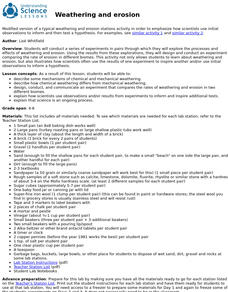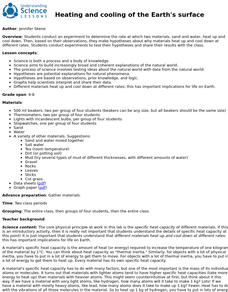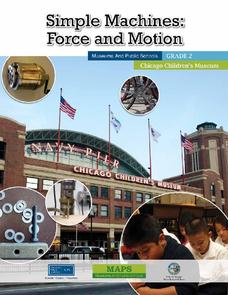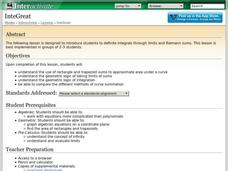Ohio State University
Ohm's Law
Have you ever wanted to build a conductor? Here is a lesson that takes pupils through building a conductor based on Drude's model in order to better understand electricity.
Curated OER
Physical Science- Sink or Float?
Learners investigate which objects sink and which ones float. Learners engage in an experiment, make predictions, and record results on a graphic organizer. This is a comprehensive and easy to follow resource.
Curated OER
The Physics of Sound: How We Produce Sounds
Students are introduced to how they produce sounds. In groups, they participate in experiments in which they measure sound and identify their five senses. Individually, they make their own musical instruments using different objects and...
Curated OER
The Physics of Sound: How We Produce Sounds
First graders construct a KWL chart on sound. In this physics instructional activity, 1st graders describe different ways to produce sound. They explain how sound waves propagate.
Curated OER
Center Stage—Focus on the Mentally and/or Physically Challenged
Students discover the skills needed to work with the mentally and physically challenged. In this service learning lesson, students create a set of guidelines for working with the mentally and physically challenged.
Curated OER
Homopolar Motor Experiments
Students construct a homopolar motor following certain procedures. In this physics lesson, students explain how generators and motors work. They compare and contrast the characteristics of both.
Curated OER
Pendulum Lab in 9th Grade Physical Science
Ninth graders conduct experiments to determine what affects the rate of a pendulum's swing. Working in small groups, they identify an independent variable to study and create an experiment to test their hypothesis. When tests are...
Curated OER
The Physics of the Planets: How 16th and 17th Century Physicist Helped Us Understand Our Solar System
Eighth graders draw the paths of the planets in the solar system. In this astronomy lesson, 8th graders calculate speed of objects using distance and time information. They research about the work of scientists in the 16th and 17th century.
Curated OER
Up and Atom
"Up and Atom" is a mini-unit introducing middle-schoolers to the wonders of elements. Participants draw atom models, examine the periodic table, compare samples of metals to nonmetals, identify unknown elements, and more! The beginning...
University of California
Weathering and Erosion
Just how powerful is erosion? Interested scientists learn how to identify the results of erosion with a series of lab activities. They move through stations to experiment with different types of erosion and then design and complete their...
University of California
Heating and Cooling of the Earth's Surface
Scholars collect data from heating sand and water before forming testable hypotheses about why sand heats up faster. Afterward, they develop and run experiments to test their hypotheses.
It's About Time
Elements and Their Properties
How did ancient scientists classify elements? Answer this question and others as young chemists create a device to test the properties of various elements. They classify elements as metals or nonmetals, learn to differentiate...
PBS
Blow the Roof Off!
Blow the minds of young scientists with this collection of inquiry-based investigations. Based on a series of eight videos, these "hands-on, minds-on" science lessons engage young learners in exploring a wide range of topics...
Curated OER
Physical Differences
Students role play what it would be like to have a physical disability. In this lesson on acceptance, students listen to the book A Rainbow of Friends by P.K. Hallinan. As a class, the students discuss similarities and differences in...
Curated OER
How to identify a physical change from a chemical change
Students identify the difference between some physical and chemical properties and compare some physical and chemical changes. They design an experiment to distinguish between a physical or a chemical property of their choice.
Curated OER
Puberty/Adolescence, Day 2: "Who AM I? Where Am I Going?"
A great unit! There is a lot of content that is personal so make sure you have created a safe zone in your classroom before doing this lesson. It will have much more meaning if your learners share their life with others in the class....
Science Matters
Thermal Energy Flow in Materials
The sun sends the earth 35,000 times the amount of energy required by all of us on the entire planet, every day. The fourth lesson in the 10-part series looks at how light energy from the sun transfers into thermal energy. Scholars build...
Curated OER
Sports and Science
Using footballs, basketballs, tennis balls, and more, learners conduct experiments to illustrate Newton's Laws of Motion. The experiments are conducted outside, and require them to throw, kick, and hit a variety of balls. Your...
Chicago Children's Museum
Simple Machines: Force and Motion
Get things moving with this elementary science unit on simple machines. Through a series of nine lessons including teacher demonstrations, hands-on activities, and science experiments, young scientists learn about forces, motion,...
University of California
Hot! Hot! Hot!
Calories are not tiny creatures that sew your clothes tighter every night, but what are they? A science lesson, presented at multiple levels, has learners experiment with heat, heat transfer, and graph the function over time....
Mathematics Vision Project
Module 1: Getting Ready Module
This fabulous resource is a must-have for any algebra teacher's arsenal of lessons. Developing the idea of equations and use of variables from basic physical scenarios, learners gain valuable intuition in the structure and meaning of...
Curated OER
The Old Man and the Sea: Guided Imagery
What do you imagine when you think of the sea? Put on some ocean sounds, close your eyes, and listen to a guided meditation based on the imagery from The Old Man and the Sea by Ernest Hemingway. After class members listen to...
Massachusetts Institute of Technology
Lego Atoms and Molecules: Chemical Reactions
Show young chemists what a chemical reaction looks like with two parts of a hands-on experiment. First, learners conduct a wet lab where they observe the reactants (baking soda and calcium chloride, with phenolsulfonphthalein)...
Shodor Education Foundation
InteGreat
Hands-on investigation of Riemann sums becomes possible without intensive arithmetic gymnastics with this interactive lesson plan. Learners manipulate online graphing tools to develop and test theories about right, left, and...

























